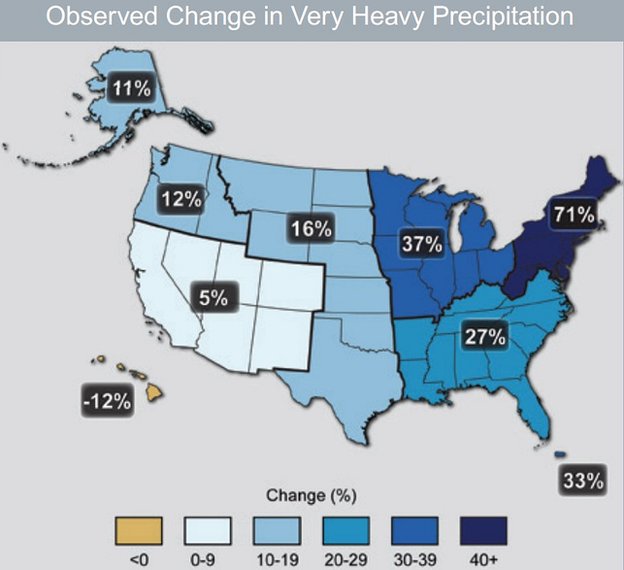Climate change is having significant financial, ecological and human health impacts across the US, according to a new report.
The third National Climate Assessment, released by the White House, says the number and strength of extreme weather events have increased over the past 50 years.
Infrastructure is being damaged by sea level rise, downpours and extreme heat.
The report says these impacts are likely to worsen in the coming decades.
Coming hot on the heels of the trio of reports from the Intergovernmental Panel on Climate Change (IPCC), the assessment re-iterates the finding that climate change is real, and “driven primarily by human activity”.
“If we don’t slam the brakes on the carbon pollution driving climate change, we’re dooming ourselves and our children”
Frances Beinecke Natural Resources Defense Council
A key element driving this conclusion is the observed evidence on extreme weather events such as heavy downpours of rain.
Between 1958 and 2012, the amount of precipitation falling in very heavy events increased by 71% in New England and the north east, while in the drier West it went up by just 5%.
“There is no equivocation,” said lead author Prof Gary Yohe from Wesleyan University.
“It is fundamentally the pace of observations of extreme weather that makes it clear it is not natural variability.”
The report suggests that it is not just wet events that are becoming more common. The human influence on climate has “roughly doubled the probability of extreme heat events”, it says.
The authors point to the record-breaking summer temperatures in Texas and Oklahoma in 2011, where even during the night the mercury continued to soar.

“There have been episodes of temperatures in urban areas that are amplified by the heat island effect, where it just never recovers over the night and that dramatically affects humans,” said Prof Yohe.
“It’s impossible for the night to cool the earth.”
The report also highlights the well-documented threats from wildfires in the West and how warming could, ultimately, cut agricultural productivity.
Impacts from Sea to Shining Sea
- North East – heat waves, more extreme precipitation, coastal flooding
- Mid West – Longer growing seasons, increased crop yields, heat waves, droughts
- South West – drought, wildfires, water stress
- Alaska – Shrinking glaciers, damage to roads and ecosystems
As well as food security, the report warns that millions of people and properties are at risk from rising seas. Five million people live in areas that are 1.2 metres above the local high-tide level.
The increasing acidification of the oceans, blamed on global warming, is having financial impacts right now, said another lead author, Dr Drew Harvell from Cornell University.
She said that shellfish hatcheries were being particularly affected in the Pacific north west.
“They are being very heavily hit,” she said.
“Everything they do now requires them to monitor pH, to have sensors in their hatcheries. Some of the hatcheries have moved out of the north west because of the corrosiveness of the waters, this is a very now impact with economic consequences.”
The assessment warns that current efforts to implement emissions cuts and to adapt to changes are “insufficient to avoid increasingly negative social, environmental, and economic consequences”.
The report’s authors believe that it provides crucial ammunition for President Obama as he looks to regulate US emissions.
Last year, the President unveiled his Climate Action Plan that sets new rules on carbon emissions from power plants. However, the scientists are pessimistic that the assessment will have much of an impact in Congress.
“One of the few places in the US where it looks like climate change is a 50-50 proposition is in the Congressional record,” said Prof Yohe.
“That is problematic.”
Other scientists involved in the report believed that the deadlock in Washington didn’t reflect the breadth of US attitudes towards climate change.
Businesses, traders and people from all walks of life were seeing the impacts and wanted more information.
“It is frustrating – but I am reasonably optimistic,” said Dr David Wolfe, another lead author.
“When I move out of the Beltway, I am seeing different things, even among the farmer audience. They are all about making a profit, so they are interested in protecting what they’ve got.”
Campaigners have endorsed the report and are calling for swift action.
“Our leading scientists send a stark message: Climate change is already seriously disrupting our lives, hurting our health and damaging our economy,” said Frances Beinecke, president of the Natural Resources Defense Council.
“If we don’t slam the brakes on the carbon pollution driving climate change, we’re dooming ourselves and our children to more intense heat waves, destructive floods and storms, and surging sea levels.”